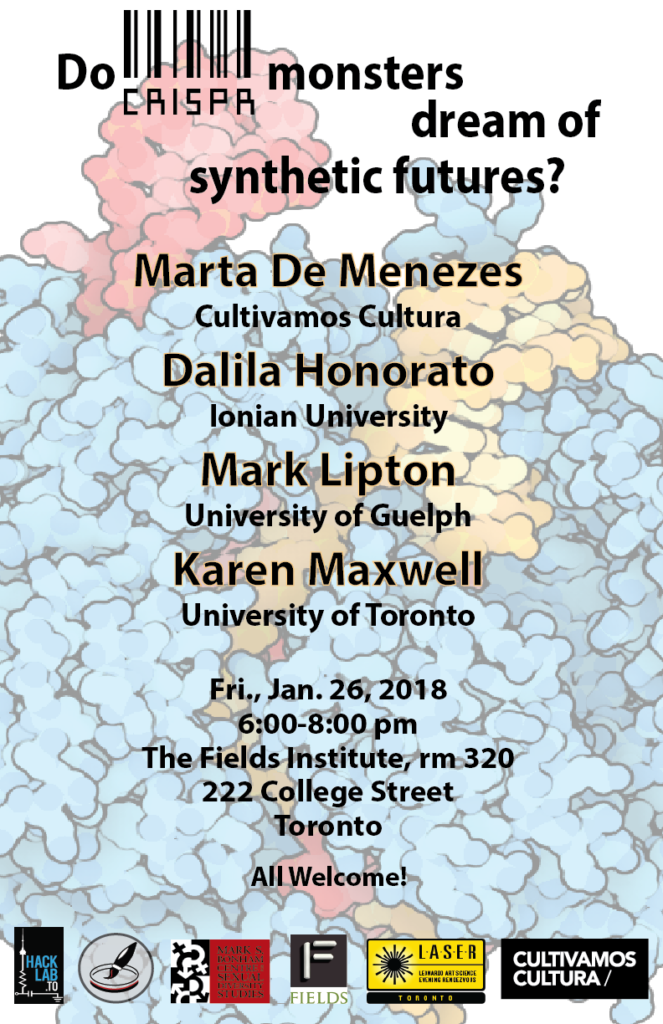description
The term CRISPR (Clustered Regularly Interspaced Short Palindromic Repeats) refers to a range of novel gene editing systems which can be programmed to edit DNA at precise locations. It allows the permanent modification of the genes in cells of living organisms. CRISPR enables novel basic research and promises a wide range of possible applications from biomedicine and agriculture to environmental challenges.
The surprising simplicity of CRISPR and its potentials have led to a wide range of reactions. While some welcome it as a gene editing revolution able to cure diseases that are currently fatal, others urge for a worldwide moratorium, especially when it comes to human germline modifications. The possibility that CRISPR may allow us to intervene in the evolution of organisms has generated particularly divisive thoughts: is gene editing going to cure us all? Or is it opening up a new era of designer babies and new types of privileges measured at the level of genes? Could the relative easiness of the technique allow individuals to modify bodies, identities, sexuality, to create new species and races? will it create new monsters? These are all topics that need to be discussed. With this panel/discussion, we wish to address technical, ethical, and creative issues arising from the futuristic scenarios promised by CRISPR.
Our Guests:
Marta De Menezes, Artistic Director, Ectopia – Experimental Art Laboratory; Director, Cultivamos Cultura
Dalila Honorato, Assistant Professor, Ionian University
Mark Lipton, Professor, University of Guelph
Karen Maxwell, Assistant professor, Dept. of Biochemistry, University of Toronto
Date: January 26, 2018
Time: 6:00-8:00 pm
Location: The Fields Institute for Research in Mathematical Sciences
222 College Street, Toronto, ON
please, RSVP here:
https://www.eventbrite.ca/e/do-crispr-monsters-dream-of-synthetic-futures-tickets-41959409724
Facebook:
https://www.facebook.com/events/2042990962613562/
Events Facilitators: Roberta Buiani and Stephen Morris (ArtSci Salon) and Nina Czegledy (Leonardo Network)
Bios:
Marta de Menezes is a Portuguese artist (b. Lisbon, 1975) with a degree in Fine Arts by the University in Lisbon, and a MSt in History of Art and Visual Culture by the University of Oxford. She has been exploring the interaction between Art and Biology, working in research laboratories demonstrating that new biological technologies, DNA, proteins and live organisms can be used as an art medium. Her work has been presented internationally in exhibitions, articles and lectures. She is since 2005 artistic director of Ectopia – Experimental Art Laboratory and from 2009 director of Cultivamos Cultura – Association. http://martademenezes.com
Dalila Honorato, Ph.D., is currently Assistant Professor in Media Aesthetics and Semiotics at the Ionian University in Greece where she is one of the founding members of the Interactive Arts Lab. She is the head of the organizing committee of the conference “Taboo-Transgression-Transcendence in Art & Science” and developer of the studies program concept of the Summer School in Hybrid Arts. She is a guest faculty at the PhD studies program of the Institutum Studiorum Humanitatis in Alma Mater Europaea, Slovenia, and a guest member of the Science Art Philosophy Lab integrated in the Center of Philosophy of Sciences of the University of Lisbon, Portugal. Her research focus is on embodiment in the intersection of performing arts and new media.
Mark Lipton works in the College of Arts; in the School of English and Theatre Studies, and Guelph’s Program in Media Studies. Currently, his work focuses on queering media ecological perspectives of technology’s role in education, with emerging questions about haptics and the body in performance contexts, and political outcomes of neo-liberal economics within Higher Education.
Karen Maxwell completed her B.Sc. in Biochemistry at the University of Waterloo and her Ph.D. in Molecular and Medical Genetics at the University of Toronto. She is currently an Assistant Professor in the Department of Biochemistry at the University of Toronto. Her research program focuses on determining how the viruses that infect and kill bacteria, known as bacteriophages or phages, contribute to human diseases. Her team is also actively pursuing engineering projects, including the use of phages for rapid point-of-care diagnosis of bacterial infections, and the application of phage genes for the control of CRISPR-Cas genome editing.
ArtSci Salon thanks the Fields Institute and the Bonham Center for Sexual Diversity Studies (U of T), and the McLuhan Centre for Culture and Technology for their support. We are grateful to the members of DIYBio Toronto and Hacklab for hosting Marta’s workshop. WE also want to acknowledge the support of Cultivamos Cultura and Arte Institute (Portuguese Contemporary Culture)
LASER – Leonardo Art Science Evening Rendezvous is a project of Leonardo® /ISAST


Comments are closed